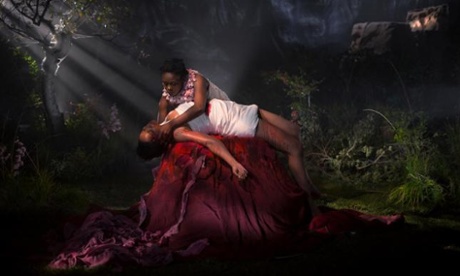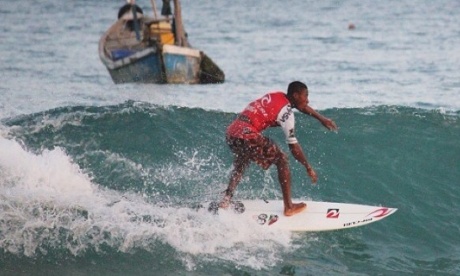Since the first colonisers landed on the continent, photography has been complicit in creating many of the modern myths about Africa.
But as an increasing number of young artists get behind the lens to tell their own stories, the view of the 54 countries is changing.
In Lagos, Nigeria, a hotbed of art, music and fashion, this week marks the beginning of LagosPhoto, one of the continent’s largest annual photography festivals.
Described as month-long celebration “challenging prevalent images of Afro-pessimism”, the photographers included in exhibition and events across the city defy the global media’s focus on Africa “as a continent of the desperate”.
Launched in 2010, participants say the festival helps showcase the quality of new work emerging from the continent, while allowing artists to meet and support each other.
Fati Abubakar, a photographer working in northern Nigeria, said: “You meet people from all over the world who teach you a lot about cultures, their experience as photographers, [their] challenges,” she says. “It is very necessary for us to not only to support [each other] but to critically assess each other so we can be better.”
Ishola Akpo, from Benin, agrees: “Meetings such as these are essential [...] they really help to nourish our work and develop new perspectives.”
Abubakar and Akpo are among 10 promising young African photographers showing at LagosPhoto, working to change the way the next generation sees Africa.
Fati Abubakar, Nigeria
Abubakar finds stories of beauty and resistance in the most unexpected places. She has taken her camera to some of Nigeria’s most dangerous regions, including Maiduguri, in the northern Borno State, where she grew up, which is now better known as the “birthplace of Boko Haram”.
At Lagos Photo, Abubakar is presenting The Face, a series of portraits from remote, rural locations in Nigeria, where despite poor living conditions, people still “find a sense of integrity and beauty, thriving in the midst of adversity”.
Ishola Akpo, Benin
Working in Benin, the photographer and multimedia artist Akpo focuses on the subject of bridal dowries in the Yoruba and Nago communities.
The symbolism of the dowry, originally one of allegiance – seen as a way of joining families, tribes and ethnicities – is now often only a financial exchange, and in his series L’Essentiel est Invisible pour les Yeux, Akpo presents objects given as part of his own grandmother’s dowry – including pearls, mirror and bottles of gin.
Nico Krijno, South Africa
Nico Krijno combines photography, performance and sculpture. His abstract compositions made in his studio in Cape Town, which he refers to as “mess aesthetics”, are created using everyday items such as Play-Doh, plastic laundry baskets, fabric curtains, discarded metal and wood.
Siwa Mgoboza, South Africa
Though Siwa Mgoboza, 23, graduated only last year, he has already had several solo exhibitions in South Africa, with many works now held in public and private collections. Colourful and carnivalesque, the brightly patterned, lavishly layered Ishweshwe cloths that feature in his photographs come from the artist’s Hlubi heritage.
Lakin Ogunbanwo, Nigeria

Mixing the high-gloss luxury of fashion photography and the refined approach of classical portraiture, Lakin Ogunbanwo’s stripped-back portraits blur the line between advertising and art. Born and based in Lagos, the 29-year-old trained as a lawyer but started taking photographs while he was still studying.
The career change paid off, and his work is now part of the new advertising and fashion industry thriving in Nigeria. Internationally, he has featured in Harper’s Bazaar, GQ and Dazed & Confused magazines among others. In 2015, he was named as one of the British Journal of Photography’s top 25 photographers.
Tsoku Maela, South Africa
Based in Cape Town, the photographer and film-maker Tsoku Maela turned to photography as a way of dealing with depression and anxiety. His series of self-portraits about mental illness, Abstract Peaces, addressed a topic treated as taboo in South Africa.
In Lagos, the artist is presenting works from his series Broken Things, which he says features two characters who learn to love themselves, despite their flaws. For Maela, “the greatest form of acceptance is self-acceptance. But it’s not out there, somewhere, waiting to be found. It’s right here where you stand, and wherever you will go, as it always begins and ends with us.”
Kudzanai Chiurai, Zimbabwe
Born in Zimbabwe only a year after the end of the white-minority rule of Rhodesia, Chiurai has often focused his lens on racial segregation. At LagosPhoto he presents a new series, Genesis, based on his research into the men who travelled with the missionary David Livingstone to central Africa in the 19th century. It focuses in particular on stone reliefs that were made to mark Livingstone’s various expeditions.
Eric Gyamfi, Ghana
Gyamfi’s photographs shed light on social tensions around gender and sexuality in Ghana. Interested in people who have suffered exclusion or been labelled as minorities in their communities in the past and present, Gyamfi’s work began with self-portraits in which he re-enacted memories from his own childhood as a way to examine his sexual identity and position in relation to the myth of masculinity.
For his series Witches of Gambaga, Gyamfi visited a “witches’ camp” in northern Ghana where 130 women aged between 17 and 90 who have been found guilty of witchcraft live. They can only be freed if a family member pays a ransom of one sheep and three hens to the camp’s chief.
“These women, broken as they were from their individual traumatic experiences, pressed on daily with such resilience and beauty, in the face of all the devastation that engulfed them inside-out. It was this beauty and strength I wanted to paint back to them,” Gyamfi says.
Léonard Pongo, Belgium/DRC
Léonard Pongo’s photographs of the Democratic Republic of the Congo are part of a personal journey to connect with his roots: raised in Belgium, he began to take pictures in his father’s homeland during the presidential elections in 2011. His portraits capture events in the DRC – families in their homes, church ceremonies, nightlife and celebrations – that are not often seen in the international media, and confront the photographer’s own perception of the country.
Keyezua, Angola
“For us, women, we can’t just make art to look pretty and successfully hang on a wall at home or in a museum. It needs to demand respect, debates, confusion and experiment with tradition,” says Keyezua.
At LagosPhoto, the Angolan artist is presenting a series of works, Royal Generation, in which a model wears clothes made by hand from raw materials using traditional basket-making techniques..
LagosPhoto runs until 21 November











